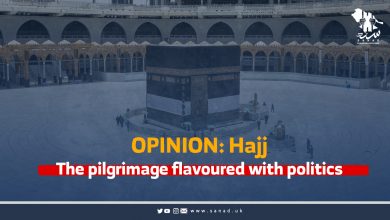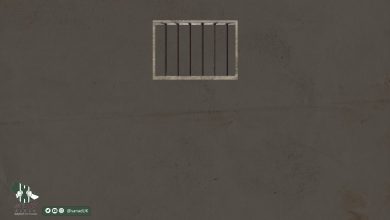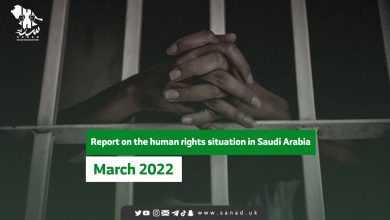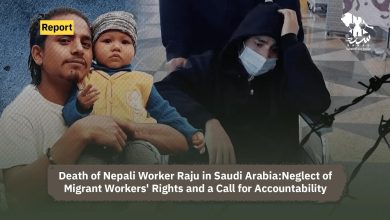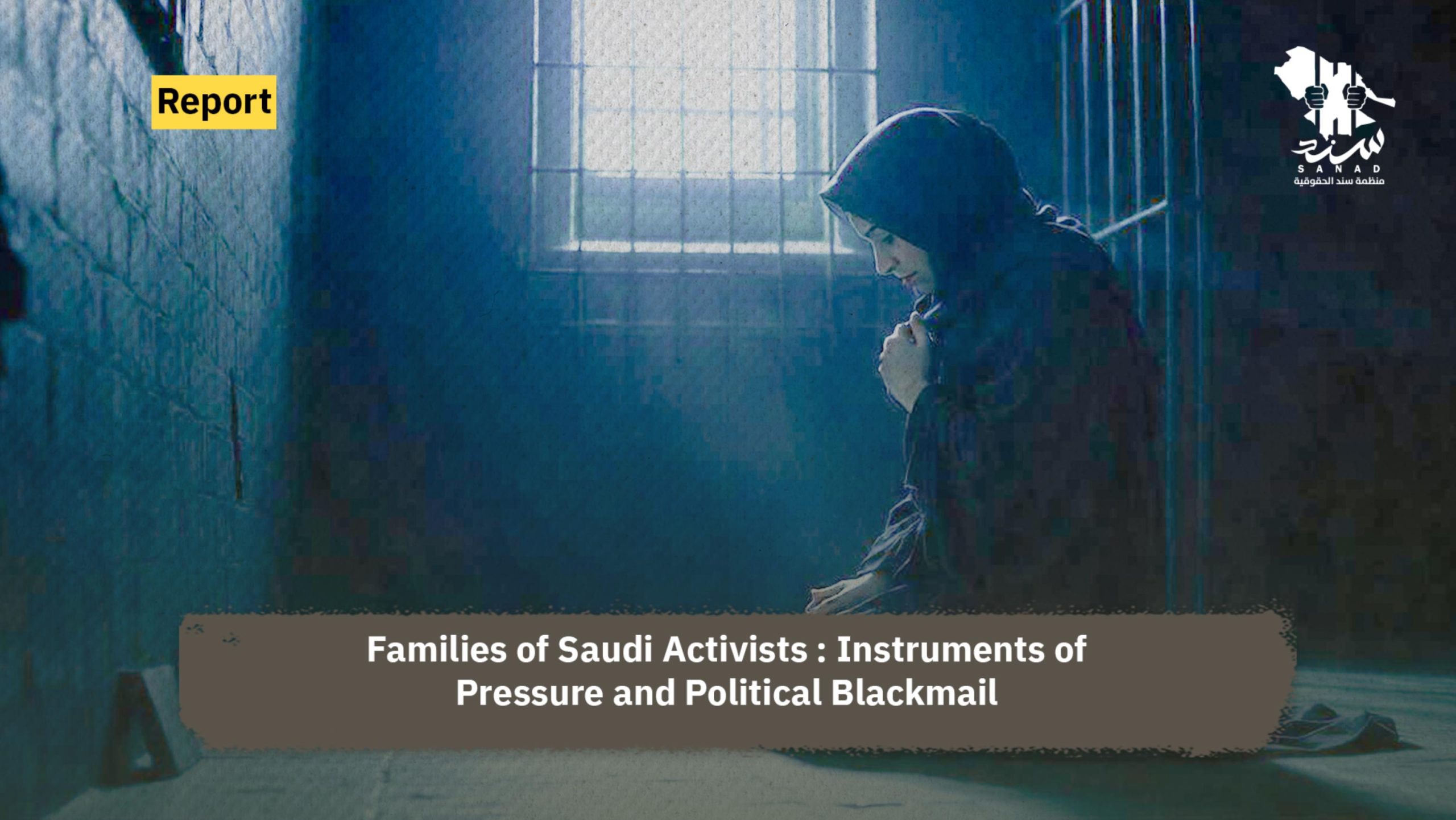
Families of Saudi Activists : Instruments of Pressure and Political Blackmail
Over the past several years, the Kingdom of Saudi Arabia has witnessed a notable deterioration in human rights conditions, with the scope of violations expanding to include a wide range of citizens — from academics and clerics to activists, journalists, and even ordinary individuals who expressed their opinions on social media. This decline has been accompanied by legal amendments designed to intensify repression under vague legal justifications, such as the revisions to the Counter-Terrorism Law and the Cybercrime Law, as well as the transfer of many powers from the Ministry of Interior to the Presidency of State Security, a body created in July 2017 that reports directly to the King — part of the Saudi government’s broader strategy of state-driven repression and intimidation.
As a result, Saudi Arabia has become one of the most repressive countries in the region, with a sharp escalation in arbitrary arrests since 2017 that has targeted even individuals once seen as loyal to the state or working within its institutions. Under the banner of “Vision 2030,” the government has used slogans of reform and openness to conceal a systematic campaign of suppression against anyone expressing independent thought or public criticism of state policies.
Arbitrary detention has thus become a political weapon used against activists, dissidents, intellectuals, and even those merely suspected of sympathy with reformist or ideological movements. These arrests are often carried out without warrants or public trials, with detainees denied access to lawyers and family contact for extended periods. SANAD has documented numerous cases of secret detention, torture, and ill-treatment.
In parallel with this field-level repression, the Saudi authorities have tightened their control over the media and public discourse. Independent platforms have been shut down, intellectual and journalistic spaces confiscated, and the public narrative reduced to a single official voice. Both state-owned and private media now operate under direct supervision of high-level security agencies, practicing self-censorship out of fear of punishment or exclusion. Consequently, the public sphere is effectively closed to any form of independent or critical expression.
The closure of safe spaces for expression inside the Kingdom has forced many activists, intellectuals, and reform advocates into exile, where a peaceful opposition movement has emerged across several countries, calling for political reform and citizens’ rights in Saudi Arabia. Rather than engaging with these calls or addressing legitimate grievances through reform and prisoner releases, the authorities have taken the opposite approach — seeking to silence these voices through cross-border repression, which has included the murder of journalist Jamal Khashoggi inside the Saudi consulate in Istanbul, the extradition and arrest of Dr. Osama Al-Husaini from Morocco, and the arrest of Mohammed Al-Otaibi from Qatar, among others targeted beyond Saudi borders.
This report sheds light on another repressive tool used by the Saudi government to silence dissent: the targeting and intimidation of activists through the arrest of their family members inside the Kingdom, as a means of pressure and blackmail.
The report documents eight verified cases, including:
Arrest of the two brothers of Dr. Saeed Al-Ghamdi — Mohammed Al-Ghamdi, who was initially sentenced to death before the verdict was later overturned and replaced with a 30-year prison sentence, and Asaad Al-Ghamdi, who was released after years of detention.
Arrest of Aida Al-Ghamdi, the mother of political and human rights activist Abdullah Al-Ghamdi, along with his brother Adel Al-Ghamdi.
Arrest of the two brothers of political and human rights activist Omar Abdulaziz Alzahrani — Ahmed and Abdulmajeed Alzahrani.
Arrest of the children of former Saudi intelligence official Saad Al-Jabri — Omar Al-Jabri and Sarah Al-Jabri.

Dr. Saeed Al-Ghamdi
Professor of Creed and Contemporary Doctrines, Islamic thinker, researcher, and Saudi political and human rights activist
The family of London-based Saudi dissident Dr. Saeed Al-Ghamdi has been subjected to a series of deliberate violations, as part of the Saudi authorities’ policy of family-based retaliation against exiled dissidents.
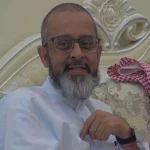
In June 2022, Saudi authorities arrested retired teacher Mohammed Nasser Al-Ghamdi, Dr. Saeed’s brother, over five tweets allegedly posted from an anonymous Twitter account. Despite the trivial nature of the accusations and the absence of any incitement to violence, the Specialized Criminal Court sentenced him to death in July 2023. Dr. Al-Ghamdi described the verdict as a personal act of reprisal, following several failed attempts by the authorities to lure him back to the Kingdom.
Following widespread international pressure — including efforts by the U.S. State Department, Human Rights Watch, Amnesty International, and a UN Working Group on Arbitrary Detention opinion — the death sentence was commuted to an arbitrary 30-year prison term.

The targeting did not stop there. Dr. Al-Ghamdi’s second brother, teacher Asaad Al-Ghamdi, was arrested in November 2022, and after an unfair trial, sentenced to 20 years in prison, later reduced to 15 years. However, continued human rights pressure throughout his detention led to his release in February 2025, after more than two years of arbitrary imprisonment.
Beyond these arrests, Saudi authorities also imposed a blanket travel ban on all members of Dr. Saeed Al-Ghamdi’s family inside the Kingdom, preventing them from leaving the country — a clear act of collective punishment aimed at isolating dissidents from their families and instilling fear within Saudi society.

Omar Abdulaziz Alzahrani
Saudi Political and Human Rights Activist
On August 21, 2018, Saudi authorities summoned and arrested Ahmad and Abdulmajeed Alzahrani, the brothers of Canada-based Saudi dissident Omar Abdulaziz Alzahrani, at Dhahban Prison in Jeddah, where they have remained detained ever since, despite having no involvement in political activity.

Their arrests followed several attempts by Saudi officials to pressure Omar Alzahrani into halting his activism and criticism of the government, efforts that included approaches made through his brother Ahmad and other official intermediaries. The repression did not stop there — it extended to some of Omar’s former friends, particularly after Saudi authorities hacked his phone.
Beyond detaining his brothers and targeting his associates, the Saudi authorities imposed a travel ban on his entire family and cut off all means of communication between them. In a recorded interview, Omar Alzahrani confirmed that contact with his family has been completely severed since 2018, as all family members remain barred from travel and two of his brothers remain arbitrarily detained, despite the family’s lack of any political engagement. This reflects a pattern of collective punishment practiced by Saudi authorities against the families of dissidents.

Abdullah Al-Ghamdi
Saudi Political and Human Rights Activist
On March 26, 2018, Saudi authorities arrested Abdullah Al-Ghamdi’s mother, Aida Al-Ghamdi, and his brother, Adel Al-Ghamdi, without a warrant, while they were on their way to a shopping center in Al-Jami‘ah district, Dammam. The arrest was carried out by agents from the General Directorate of Investigation (Mabahith) under the Presidency of State Security, who were dressed in civilian clothing.
Both were subjected to physical and psychological torture and were forcibly disappeared for three months. They were denied legal representation and tried before a court lacking basic standards of justice, which sentenced Aida to 16 years in prison and Adel to 14 years.
In public statements, Abdullah Al-Ghamdi confirmed that the circumstances of their arrest clearly indicate that his human rights and political activism were the real reason behind their detention. He revealed that they were beaten, tortured, and burned with cigarettes, and held in prolonged solitary confinement. He was also warned that any attempt to contact his family could endanger their lives.
The UN Working Group on Arbitrary Detention later concluded that the arrest of Aida and Adel Al-Ghamdi was directly linked to Abdullah’s activism abroad, describing it as part of a retaliatory campaign aimed at forcing him to abandon his political stance. Furthermore, all members of Abdullah’s family have been banned from travel, despite having no political or human rights activity of their own.

Lt. Gen. Saad Al-Jabri
Former Saudi Minister and Intelligence Official, Adviser to Former Crown Prince Mohammed bin Nayef
On March 16, 2020, Saudi authorities arrested Sarah and Omar Al-Jabri, the children of former intelligence official Saad Al-Jabri, without judicial orders or arrest warrants, after agents from the Presidency of State Security — wearing civilian clothes — surrounded their home in Riyadh and took them to an undisclosed location.
They were held incommunicado for several months, with their family denied knowledge of their whereabouts or the ability to contact them. They were also denied legal counsel and not brought before an independent court.
During their detention, both were subjected to ill-treatment and severe psychological pressure, including prolonged solitary confinement, repeated interrogations without legal representation, and threats against other family members. According to documentation by a UN Working Group decision, they were forced to sign confessions under duress, which were later used as evidence against them in court.
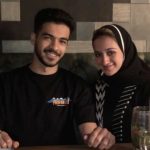
At the end of 2020, they were brought before the Specialized Criminal Court for a secret trial without access to lawyers or the right to defend themselves. The court sentenced Omar to nine years and Sarah to six and a half years in prison on charges related to their father’s activities. Human Rights Watch described the case as a grossly unfair trial, intended to pressure Saad Al-Jabri into returning to Saudi Arabia.
In 2022, the UN Working Group on Arbitrary Detention (Opinion No. 29/2022) concluded that the detention of Sarah and Omar Al-Jabri was arbitrary, motivated solely by their family relationship to their father, and aimed at coercing him into returning to the Kingdom — a finding Saad Al-Jabri himself has publicly confirmed multiple times.
Conclusion and Recommendations
The documented cases presented in this SANAD Human Rights Organization report confirm that the Saudi government’s use of blackmail and pressure against the families of dissidents is not a series of isolated incidents or exceptions, but rather part of a systematic policy aimed at silencing all critical voices and suffocating freedom of expression—not only within Saudi Arabia’s borders, but even beyond them.
This approach does not target only those who have previously expressed opposition; it is designed to intimidate anyone who might consider criticism, sending a clear message: your family will pay the price for your opinions.
The continued impunity of Saudi authorities in committing these violations has been enabled by international inaction and the absence of genuine accountability. This demands stronger pressure and concerted efforts from human rights organizations and international institutions to end this escalating, systematic repression.
SANAD Human Rights Organization calls for:
- The immediate release of all detainees held by Saudi authorities as a means of blackmail against their relatives.
- An end to the policy of collective punishment targeting the families of activists and dissidents, and full respect for the principle of individual accountability.
- The international community and human rights organizations to launch an independent investigation into cases of arbitrary detention, torture, and ill-treatment of relatives of dissidents, and to hold those responsible accountable.
- The international community to enhance protection and support for human rights defenders and dissidents abroad, ensuring that neither they nor their families inside the Kingdom are targeted.
- The international community, including governments, international bodies, and human rights organizations, to hold accountable those responsible for these violations—foremost among them Crown Prince Mohammed bin Salman—and to impose targeted international sanctions against him and those involved, until the ongoing repression and human rights abuses in Saudi Arabia come to an end.


